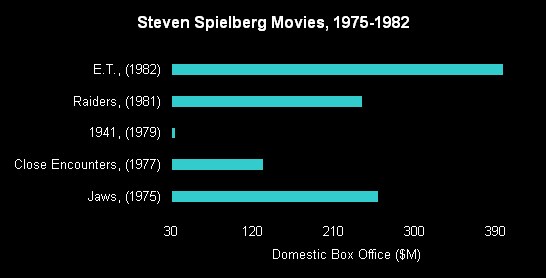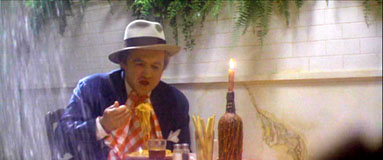|
I suppose it was more than fitting that this film was a December release in 1979 and was therefore playing on the day the 70s ended, because the story of this film was a microcosm of the story of Hollywood in the 70s. (See the reviews of Heaven's Gate and One From the Heart for the historical backdrop and the parallel stories about Francis Ford Coppola and Michael Cimino.) In the happier times, Spielberg had just about single-handedly ushered in the era of the blockbuster with Jaws in 1975, and had then followed up with the commercially successful and critically lauded Close Encounters. He was Hollywood's infallible wunderkind. Of course, every director will have a failure sooner or later, but Spielberg never had at that point, so he was virtually given a blank check to do whatever he wanted to do with whatever resources he needed. What Spielberg wanted to do was a comedy, and the resources he needed turned out to be six months of shooting and $32 million, not as much as Cimino's studio-destroying Heaven' Gate, but more than Coppola's studio-destroying One From the Heart. 1941 cost a bundle because Spielberg didn't favor one of those sardonic, personal Woody Allen comedies, or a zany spoof like Airplane, but a big old fashioned madcap Hollywood comedy like It's A Mad, Mad, Mad, Mad World - with lots of big stars in constant motion, surrounded by big expensive effects. Spielberg himself described it best with astonishingly accurate self-perception: "We went from one plot to seven subplots. But at the time I wanted it - the bigness, the power, hundreds of people at my beck and call, millions of dollars at my disposal, and everyone saying yes, yes, yes."1 His friends wondered why he chose this project, because he had never shown any sign of being funny, but comedy was the rage at the time, and that's what he wanted to do, so the great director hired stars from Animal House, Saturday Night Live, Laverne and Shirley, and SCTV, and put them into a contrived story about the paranoia in California in the days immediately following Pearl Harbor. The idea behind the story wasn't so bad at all. America wasn't sure whether Tokyo was planning further assaults on American soil, so people in authority were hastily creating emergency civil defense plans, and Average Joe was preparing to enlist, be drafted, or defend his house in hand-to-hand combat if need be. Californians were reporting real or imaginary sightings of enemy aircraft and enemy submarines. A lot of people were acting paranoid, and a deep patriotism was sweeping the land. There is probably the clay for a good comedy there. This movie isn't it. Why did it fail despite great comedians and a great concept? Spielberg simply found he had no gift for comedy. As he told author Peter Biskind, "Power can go right to the head. I felt immortal after a critical hit and two box office hits, one being the biggest box office hit in history up to that moment. I was very indulgent on 1941 simply because I was insecure with the material. It wasn't making me laugh or any of us laugh, either in dailies or on the set. So I shot the movie every which way I knew how, to try to save it from what it actually became, which is a demolition derby."2 Spielberg is exactly correct in his perception. The film equates destruction with humor, on the speculation that more and bigger explosions produce proportionate increases in laughter. Thousands of things are destroyed by hundreds of explosions. When the characters are not noisily breaking big things like theaters and houses and paint factories and amusement parks, they are noisily breaking small things like plates and eggs. The actors seem to feel that they have to compete with the explosions on a decibel level, and most of the film's lines are delivered in big, loud, obvious ways, as if every character were performed by Jerry Lewis. 1941 is not only too noisy, but just too busy in general. The characters and the camera are in constant frenetic motion, and there are often many things going on at once, and/or many people within sight of the camera. There are so many sub-plots that it isn't possible to get involved in any of them, and some of them are just plan grating. Above all, the film just isn't funny. I don't know if I laughed once during the entire film. Not even at Belushi. Spielberg knew it was a poor film after he had assembled it. He was so certain that it would be a disaster that he skipped the premieres and headed to Japan with Amy Irving. He was right about the film. The reviews were bad. The box office was disappointing, to say the least. This chart of five consecutive Spielberg releases just about says it all:
The time when he got off that plane in Japan may have been the low point of his life. He not only had to hear about the film's anemic two million dollar opening weekend, but he had broken off with Amy during the flight. Oh, well. He would go on to plenty of happy endings - good relationships, and some of the best films of all time:
But 1941 will always be there to haunt him. And us. |
|
|
Footnotes: 1- "Steven Spielberg", by Joseph McBride, p. 306. (See link below.) 2- "Easy Riders, Raging Bulls", by Peter Biskind, p. 384. (See link below.) Historical curiosity:
|
|
Historical curiosity:
|
|



